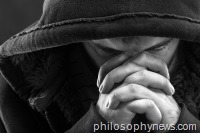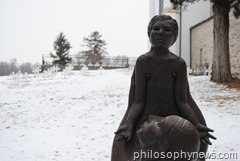A Look Into Moral Philosophy
 Should a man ever seek what is Good in life? In order to answer that question, we must first ask what does ‘Good’ mean? We tend to use the term in more “pedestrian” ways like, “I want a good burger with crisp hot fries and “This hot summer day is giving me a good attitude.” But in Moral Philosophy, ‘the Good’ is usually considered to be a noun, as in a “thing” to obtain. The Good is the ultimate end of all things. It’s the salt on your fries; the warmth of the sunlight; the Good is the essence of all experiences.
Should a man ever seek what is Good in life? In order to answer that question, we must first ask what does ‘Good’ mean? We tend to use the term in more “pedestrian” ways like, “I want a good burger with crisp hot fries and “This hot summer day is giving me a good attitude.” But in Moral Philosophy, ‘the Good’ is usually considered to be a noun, as in a “thing” to obtain. The Good is the ultimate end of all things. It’s the salt on your fries; the warmth of the sunlight; the Good is the essence of all experiences.
Recently, I had the great privilege of observing the monks at the Abbey of Gethsemani. The abbey sits peacefully in the middle of a giant forest outside the small town of New Haven, Kentucky. When I first heard that the biggest abbey in the western world was in Kentucky, I shook my head in disbelief and doubted such a thing could be true. After all, Kentucky is not known for its abbeys but rather her beautiful landscapes, rich farmland, and the ever-impressive Kentucky Derby. But nonetheless, there I was in the middle of winter at the monastery — in the middle of Kentucky.
French monks founded the snow-covered monastery in 1848. The peacefulness of it all was breathtaking. The riverbanks had frozen over, the trees buckled under the weight of their ice-covered branches, and the decaying  tombstones were covered in brown moss with little white snowflakes atop them. When the sunrays broke through the grey clouds they bounced off the ice-covered limbs showcasing what appeared to be crystal branches. Saint Augustine once spoke of “the Good”, or in his words, ‘experiencing life’ but could such a life really be experienced at an abbey? Could a monk tucked away from the world be experiencing life at its highest good?
tombstones were covered in brown moss with little white snowflakes atop them. When the sunrays broke through the grey clouds they bounced off the ice-covered limbs showcasing what appeared to be crystal branches. Saint Augustine once spoke of “the Good”, or in his words, ‘experiencing life’ but could such a life really be experienced at an abbey? Could a monk tucked away from the world be experiencing life at its highest good?
At the Academy, Plato taught his pupils that in our realm the Good was unattainable. Our senses are flawed and at best our reason is passively aware. Man must strive, Plato claimed, to free themselves from the shackles of this realm and push forward to the realm of the Forms. In the realm of the Forms man would find nourishment for his weaken intellectual state. There he could focus his attention on the warmth of the sun, or the salt on his fries so to speak. Man could embrace the pureness of all things. No longer would he see the world through his cloudy senses. He would be awakened and enlightened.
Many years after Plato walked the halls of the Academy, his successor Cicero would form a “New Academy”, one that would take Plato’s teachings and push them closer to skepticism. Cicero claimed you could never obtain such a thing as the Good, so don’t bother seeking it. At the New Academy, someone could be considered wise – but that can only be true if he understands signs, and these signs can’t belong to anything that can be doubted. Cicero would go on to claim the search for what is wise can only be sought in the range of philosophical enquiry and signs are not accessible in philosophy, nothing can be perceived. As a result, man will never be perfectly wise. Thankfully, Saint Augustine provided us with a way out of the endless academic argument for obtaining the Good. Simply put, he recommends that we “experience” life.
 St. Augustine led a very different lifestyle than the monks here at the abbey. As the son of a heathen, he was a professional rhetorician full of lust and ambition. He was determined to live life to its highest position of power. St. Augustine proclaimed he was the creator of his own path, and this path nearly destroyed his morality. As time passed for Augustine, he fell into a pattern of life that many follow. We are raised in an atmosphere where pride and accomplishments are praised. We aspire to greatness and focus our energy on discovery. But the longing for discovery can turn into a reshuffling of the work of others. Our aspiration for greatness gives way to the mundane work that’s necessary to put the kids through college, or worse, food on the table. It becomes predictable and mundane; what you do today, you will do tomorrow, and so on. St. Augustine would come to realize that while all knowledge can be doubted and sense perception is cloudy, it is through experiencing the Good that man’s joie de vivre can be cleansed and renewed. This is what I saw in practice at the abbey.
St. Augustine led a very different lifestyle than the monks here at the abbey. As the son of a heathen, he was a professional rhetorician full of lust and ambition. He was determined to live life to its highest position of power. St. Augustine proclaimed he was the creator of his own path, and this path nearly destroyed his morality. As time passed for Augustine, he fell into a pattern of life that many follow. We are raised in an atmosphere where pride and accomplishments are praised. We aspire to greatness and focus our energy on discovery. But the longing for discovery can turn into a reshuffling of the work of others. Our aspiration for greatness gives way to the mundane work that’s necessary to put the kids through college, or worse, food on the table. It becomes predictable and mundane; what you do today, you will do tomorrow, and so on. St. Augustine would come to realize that while all knowledge can be doubted and sense perception is cloudy, it is through experiencing the Good that man’s joie de vivre can be cleansed and renewed. This is what I saw in practice at the abbey.
In the abbey library sits a welcome manual that tells of the lifestyle of the monks there. They cook, clean, harvest the wheat, maintain the grounds, and commune with God; not much of what modern man calls “life” going on at first glance. It seems as if the monks have succumbed to Cicero’s ideas that you will never obtain the Good, so just put your head down and pray – or in civilian terms, just hope for the best.
By studying moral philosophy, hopefully we explore ideas longing that the end result will lead us to truth, justice, and the Good. However, St. Augustine’s pupil Trygetius once argued the search is pointless because man cannot obtain the Good, thus he can never be happy – so why torture yourself! Wouldn’t the better life be like ones led by the monks at the abbey: man must escape it all and come to grips with the realization that to desire truth is to embrace misery. But that’s not what I saw at the abbey at all.
St. Augustine countered the arguments of his misguided pupil by saying when you experience life, you are experiencing the Good… in fact, you are experiencing the Good within yourself. St. Augustine said,
“[experiencing life] is happiness. It is my opinion that only God, or perhaps the soul of man once it has abandoned this body, this dark prison, can know the truth of which we speak. He, who devotes himself to
the finding truth, even if he does not find it, is happy. He accomplishes all that he was born to accomplish. For wisdom is not only the knowledge of, but also the search for those things both human and divine. For by the fact alone of seeking, man is wise. He frees his mind as far as possible from all the folds of the body, and collects himself from within himself. And, when he finds himself on the last day of his life, he is now in possession of what he desired, or at the very least he has partaken in human happiness, and deservedly now enjoys that which is divine” (Against the Academics).
The monks at the abbey aren’t escaping life…they’re embracing it! They grow their own food and understand its relation to the Earth. They contemplate the cycle of the sun, which warms the Earth, and grow the trees that shade their flowers. Just as God has sheltered them, they too shelter the birds, the deer, and the other animals in their care. They maintain the grounds with pristine care and tend the graves of their sleeping brothers. While harvesting their wheat they talk about life and what affects our moods and thoughts. They break bread together, not with a cellphone in hand, but with a cup that runneth over. They connect with each other, they commune with each other, and they are living life that we can truly call “good” in a way that seems to exceed what we moderns have created.
That perspective must be emphasized when studying moral philosophy. If the Good is about “experience”, we must understand “the Good” will never be achieved by sitting in an armchair hoping it finds you. The Good will be found as you experience life wholeheartedly, and in that, we discover our own essence.
“Collects himself from within himself” ~St. Augustine








